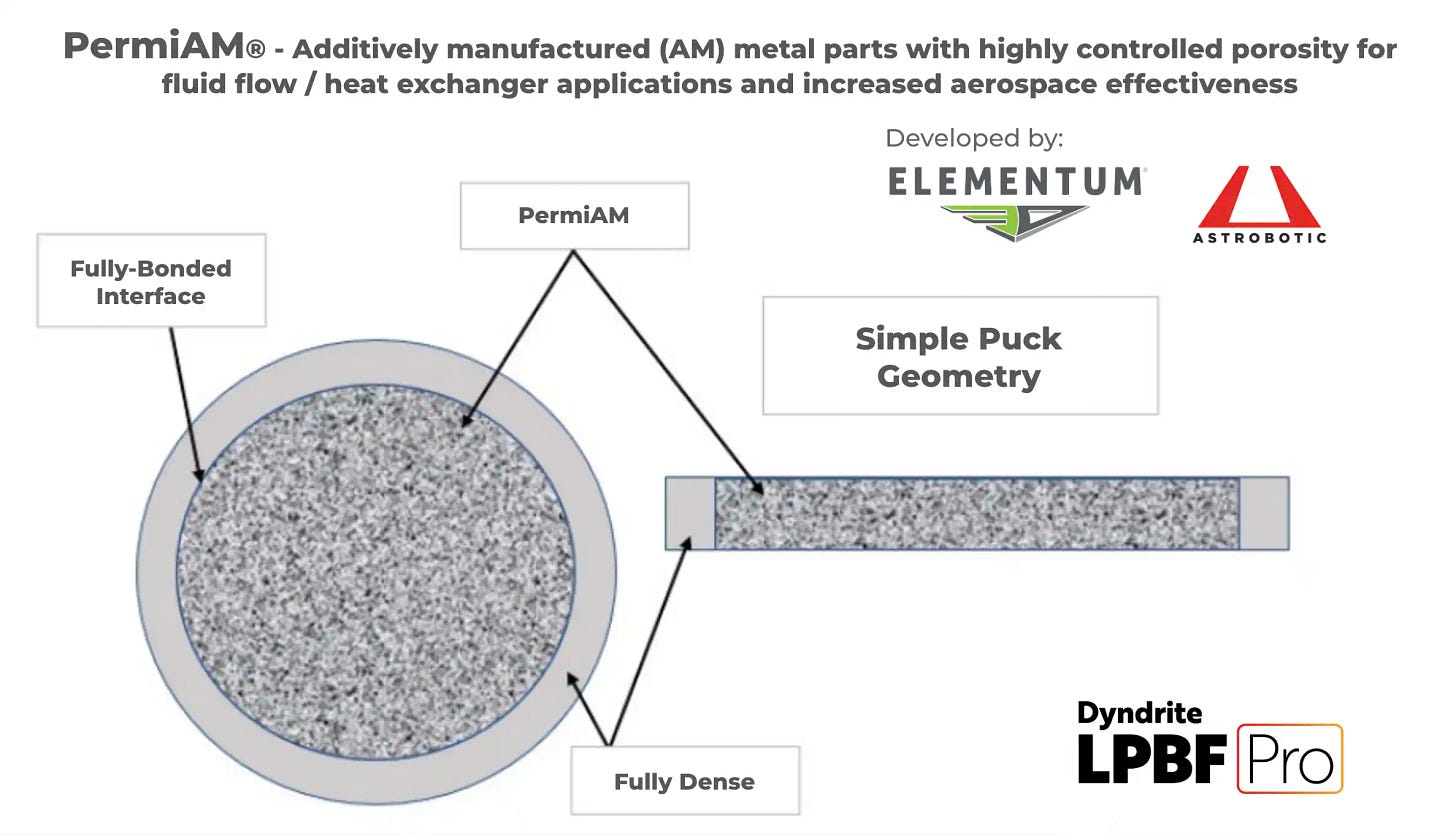A revolution in metal 3D printing: Dyndrite and Elementum3D unlock controlled permeability!
The Atomic Layers: S8E14 (00220)
Atomic Layer of the Day:
Dyndrite has announced the implementation of PermiAM technology, developed by Elementum3D, into its flagship software, Dyndrite LPBF Pro. PermiAM is a patented additive manufacturing technology that enables 3D printing of metal components with controlled porosity and full density within a single part.
The integration of PermiAM with Dyndrite software opens up new possibilities for LPBF technology, particularly in applications requiring precise fluid flow management and extreme performance—such as aerospace, defense, data centers, and next-generation propulsion systems.
PermiAM allows for the creation of parts in which different areas can have varying material properties—from porous to fully dense—within a single manufacturing process.
This enables engineers to design components optimized for coolant flow while maintaining structural integrity. The technology eliminates the need for assembling multiple components, reducing the risk of failure and lowering production costs.
A key example of its application is the hot fire testing of a 3D-printed fuel injector, confirming the effectiveness of this method in extreme conditions such as rocket engines and hypersonic applications.
The integration of PermiAM with Dyndrite LPBF Pro—software powered by a GPU-accelerated computation engine—enables far more advanced applications. Engineers can now implement controlled porosity along curved 3D paths, amorphous geometries, or as functional gradients between porous and dense areas, significantly expanding the technology's potential use cases.
PermiAM is particularly well-suited for industries requiring precise fluid management and extreme performance:
Aerospace: Rocket engine injectors, hypersonic components, and jet engines benefit from optimized coolant flow and simplified design.
Defense: The technology has been selected by AFWERX (a U.S. Air Force program) for process automation demonstration, highlighting its potential for military applications.
Data Centers: Precise cooling of electronic components is crucial in the era of increasing computational power.
Automotive: Fuel injection systems can become more efficient through customized porosity.
Key benefits include:
Reduction of design and production stages.
Lower costs by eliminating the need to assemble multiple parts.
Increased reliability due to fewer potential failure points.
The ability to create previously unachievable designs.
The PermiAM plugin will be available through Elementum 3D as an add-on for Dyndrite LPBF Pro, making it easier for engineers to implement this technology.
Additionally, Elementum 3D, in collaboration with Dyndrite, has secured a contract from AFWERX to develop a proof-of-concept using PermiAM in complex geometries. The companies are currently seeking partners from the defense and aerospace sectors (particularly the U.S. Air Force) for Phase II development, which will focus on real-world applications.
Now, why is this such a big deal?
This marks a groundbreaking moment at the intersection of additive manufacturing and advanced production software. The integration of PermiAM with Dyndrite LPBF Pro combines innovative material approaches (Elementum 3D and Astrobotic) with powerful computational tools (Dyndrite). The fact that this technology has gained support from AFWERX and is being developed for defense and aerospace applications further underscores its significance.
PermiAM enables precise control of porosity within a single part, a feat that previously required complex assembly processes or was simply too difficult before . Moreover, the combination of additive manufacturing with Dyndrite’s advanced GPU-driven software paves the way for further innovations in "software-defined materials," transforming the way we design and manufacture components.
Atomic Layer from the Past:
03-14-2017: Snapmaker launched its Kickstarter campaign.
Join AM World Map and fill your country or region with Additive Manufacturing!
News & Gossip:
Alloyed Ltd raised £37 million in Series B funding led by SPARX and the Development Bank of Japan. The investment will expand manufacturing in the UK and USA and accelerate digital alloy design. Alloyed, an Oxford University spinout, develops advanced alloys for aerospace, electronics, and wearables, serving clients like Boeing and BMW.
Lithoz introduced LithaBite alumina for 3D printed translucent orthodontic brackets, offering precision better than 8 µm and industrial scalability. Their new zirconia sets a benchmark for dental implants with a Weibull modulus of 20. Additionally, a clinical study confirms the long-term success of Lithoz’s LithaBone TCP 300 implants.
And finally, a piece of news from a few days ago that I completely missed: Eric Schmidt, former Google CEO, has taken over as CEO of Relativity Space and acquired a controlling stake in the company. This change of leadership follows the company’s struggles to secure funding, with his investment contingent on managing daily operations. While once known for pioneering 3D-printed rockets, Relativity is shifting toward traditional manufacturing methods, raising questions about its original cost-saving model. Co-founder Tim Ellis will remain on the board. Despite previous ambitions for a Mars mission, the company’s future under Schmidt’s leadership is expected to evolve significantly from its original vision.





While I'm glad to see this tech going out in the world, I'm frustrated it's taken this long to reach the more mainstream. I wrote a script to do this on EOS machines in early 2015 for venting tooling and had pretty good results. I called it conformal venting. I hope it works well.